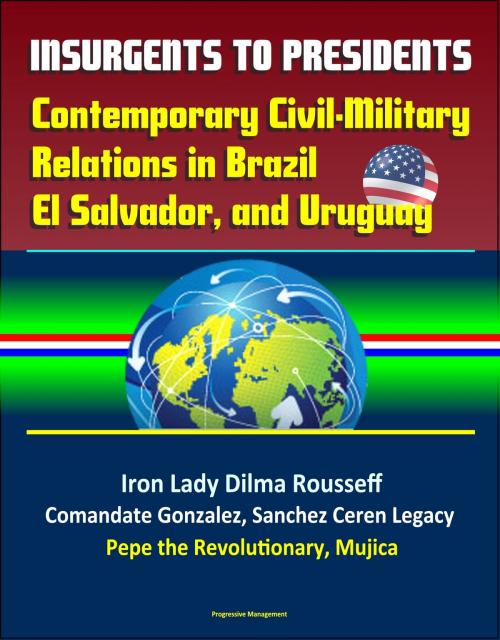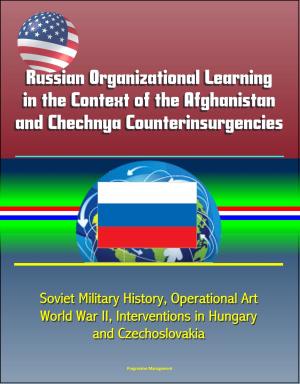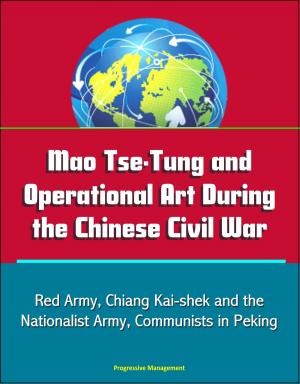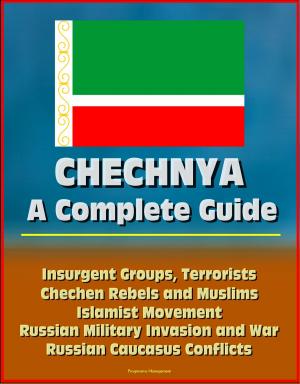Insurgents to Presidents: Contemporary Civil-Military Relations in Brazil, El Salvador, and Uruguay - Iron Lady Dilma Rousseff, Comandate Gonzalez, Sanchez Ceren Legacy, Pepe the Revolutionary, Mujica
Nonfiction, History, Americas, Central America, Latin America| Author: | Progressive Management | ISBN: | 9781370975341 |
| Publisher: | Progressive Management | Publication: | October 10, 2016 |
| Imprint: | Smashwords Edition | Language: | English |
| Author: | Progressive Management |
| ISBN: | 9781370975341 |
| Publisher: | Progressive Management |
| Publication: | October 10, 2016 |
| Imprint: | Smashwords Edition |
| Language: | English |
This important report has been professionally converted for accurate flowing-text e-book format reproduction. This study analyzes contemporary civil-military relations in three Latin American countries: Brazil, El Salvador, and Uruguay. Since 2010, each country has elected a president who was previously an armed insurgent resisting authoritarian regimes of the 1970s and 1980s. Considering this phenomenon and evaluating recent trends across Latin America to expand military roles and missions, civil-military relations are assessed using a new framework. The framework, adapted from the "trinity" model employed by scholars at the Naval Postgraduate School's Center for Civil-Military Relations, shows significant differences among the three cases and their respective degrees of positive civil-military relations; however, the specific phenomenon of electing a former insurgent to the presidency has not resulted in a significant deterioration of the relationship between the armed forces and their civilian executives. In fact, civil-military relations under ex-insurgent presidents have been improved over the last decade in each country. Ultimately, this study concludes that Uruguay has achieved the greatest degree of positive civil-military relations, and trends are presented for consideration in improving civil-military relations across the region.
CHAPTER I - INTRODUCTION * A. SIGNIFICANCE * B. LITERATURE REVIEW * 1. Professionalism * 2. Institutionalizing Civilian Control * 3. Redefining and Reforming Military Missions * C. FRAMEWORK * 1. Democratic Incorporation of the Military * 2. Democratic Oversight of the Military * 3. Military Effectiveness under Democracy * D. THESIS OVERVIEW * CHAPTER II - BRAZIL * A. BRAZILIAN MILITARY HISTORY: 1964-PRESENT * B. DILMA THE "IRON LADY" INSURGENT * C. CONTEMPORARY CIVIL-MILITARY RELATIONS IN BRAZIL * 1. Democratic Incorporation of the Military * 2. Democratic Oversight of the Military * 3. Military Effectiveness under Democracy * D. THE ROUSSEFF LEGACY * CHAPTER III - EL SALVADOR * A. SALVADORAN MILITARY HISTORY: 1979-PRESENT * B. INSURGENT LEADER "COMANDANTE GONZALEZ" * C. CONTEMPORARY CIVIL-MILITARY RELATIONS IN EL SALVADOR * 1. Democratic Incorporation of the Military * 2. Democratic Oversight of the Military * 3. Military Effectiveness under Democracy * D. THE SANCHEZ CEREN LEGACY * CHAPTER IV - URUGUAY * A. URUGUAYAN MILITARY HISTORY: 1973-PRESENT * B. "PEPE" THE REVOLUTIONARY * C. CONTEMPORARY CIVIL-MILITARY RELATIONS IN URUGUAY * 1. Democratic Incorporation of the Military * 2. Democratic Oversight of the Military * 3. Military Effectiveness under Democracy * D. THE MUJICA LEGACY * CHAPTER V - TRENDS AND RESULTS * A. TRENDS * 1. Institutional Return on Investment * 2. Culture Matters * 3. The Role of Civil Society * B. RESULTS * 1. Democratic Incorporation of the Military * 2. Democratic Oversight of the Military * 3. Military Effectiveness under Democracy * 4. Summary of Results * C. CONCLUSION * APPENDIX * LATINOBAROMETRO POLLING DATA * LIST OF REFERENCES
This important report has been professionally converted for accurate flowing-text e-book format reproduction. This study analyzes contemporary civil-military relations in three Latin American countries: Brazil, El Salvador, and Uruguay. Since 2010, each country has elected a president who was previously an armed insurgent resisting authoritarian regimes of the 1970s and 1980s. Considering this phenomenon and evaluating recent trends across Latin America to expand military roles and missions, civil-military relations are assessed using a new framework. The framework, adapted from the "trinity" model employed by scholars at the Naval Postgraduate School's Center for Civil-Military Relations, shows significant differences among the three cases and their respective degrees of positive civil-military relations; however, the specific phenomenon of electing a former insurgent to the presidency has not resulted in a significant deterioration of the relationship between the armed forces and their civilian executives. In fact, civil-military relations under ex-insurgent presidents have been improved over the last decade in each country. Ultimately, this study concludes that Uruguay has achieved the greatest degree of positive civil-military relations, and trends are presented for consideration in improving civil-military relations across the region.
CHAPTER I - INTRODUCTION * A. SIGNIFICANCE * B. LITERATURE REVIEW * 1. Professionalism * 2. Institutionalizing Civilian Control * 3. Redefining and Reforming Military Missions * C. FRAMEWORK * 1. Democratic Incorporation of the Military * 2. Democratic Oversight of the Military * 3. Military Effectiveness under Democracy * D. THESIS OVERVIEW * CHAPTER II - BRAZIL * A. BRAZILIAN MILITARY HISTORY: 1964-PRESENT * B. DILMA THE "IRON LADY" INSURGENT * C. CONTEMPORARY CIVIL-MILITARY RELATIONS IN BRAZIL * 1. Democratic Incorporation of the Military * 2. Democratic Oversight of the Military * 3. Military Effectiveness under Democracy * D. THE ROUSSEFF LEGACY * CHAPTER III - EL SALVADOR * A. SALVADORAN MILITARY HISTORY: 1979-PRESENT * B. INSURGENT LEADER "COMANDANTE GONZALEZ" * C. CONTEMPORARY CIVIL-MILITARY RELATIONS IN EL SALVADOR * 1. Democratic Incorporation of the Military * 2. Democratic Oversight of the Military * 3. Military Effectiveness under Democracy * D. THE SANCHEZ CEREN LEGACY * CHAPTER IV - URUGUAY * A. URUGUAYAN MILITARY HISTORY: 1973-PRESENT * B. "PEPE" THE REVOLUTIONARY * C. CONTEMPORARY CIVIL-MILITARY RELATIONS IN URUGUAY * 1. Democratic Incorporation of the Military * 2. Democratic Oversight of the Military * 3. Military Effectiveness under Democracy * D. THE MUJICA LEGACY * CHAPTER V - TRENDS AND RESULTS * A. TRENDS * 1. Institutional Return on Investment * 2. Culture Matters * 3. The Role of Civil Society * B. RESULTS * 1. Democratic Incorporation of the Military * 2. Democratic Oversight of the Military * 3. Military Effectiveness under Democracy * 4. Summary of Results * C. CONCLUSION * APPENDIX * LATINOBAROMETRO POLLING DATA * LIST OF REFERENCES















